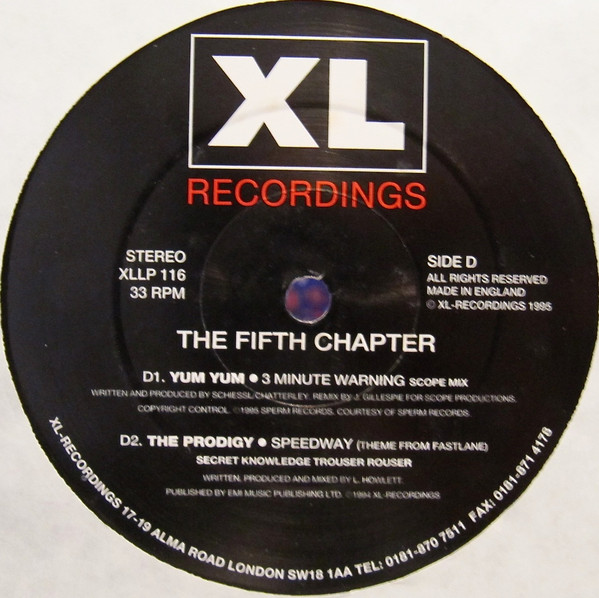#Jilted: Speedway • Ambient • The Heat
After a s̶h̶o̶r̶t̶ ̶b̶r̶e̶a̶k̶ (long break), we continue our series of articles about the creation of each track from The Prodigy’s album Music for the Jilted Generation. This feature is dedicated to the Speedway (Theme from Fastlane) and The Heat (The Energy), as well as the mysterious ambient track between them. We will tell you how these tunes were created and how they are connected, find out all their samples, analyse the alternative and live versions, and, as always, share a couple of exclusive tracks recreated by the All Souvenirs.
SPEEDWAY
Following the explosive ‘Voodoo People’, the album takes a short breather: in ‘Speedway’, Liam Howlett cuts back the complexity and builds a straightforward acid beat. The lull doesn’t last — the track quickly picks up speed and gives no room to slow down.
Gavin (10 March 1995): “‘Speedway’ is a hypertriptic audio journey that transports the listener inside the cockpit of Racer X’s runaway virtual V-8.”
According to Liam himself, ‘Speedway’ was born out of one of his crazy motorbike rides with Keith: back then, racing along on the back seat of a bike at breakneck speed, Howlett was ready to say goodbye to life.
Liam Howlett for NME (October 1994): “Yeah I’m a bit of a speed freak. (…) I just get a buzz out of it, just being that close to death. I was hanging onto the back of his [Keith’s] bike and he was doing 160mph. [Keith has] got the fastest bike on the road, and I was on the back and my lid was like up there, pushing against my head. That was a bit nasty, actually, I thought, ‘Fuck, no. I’m dead, definitely’.”
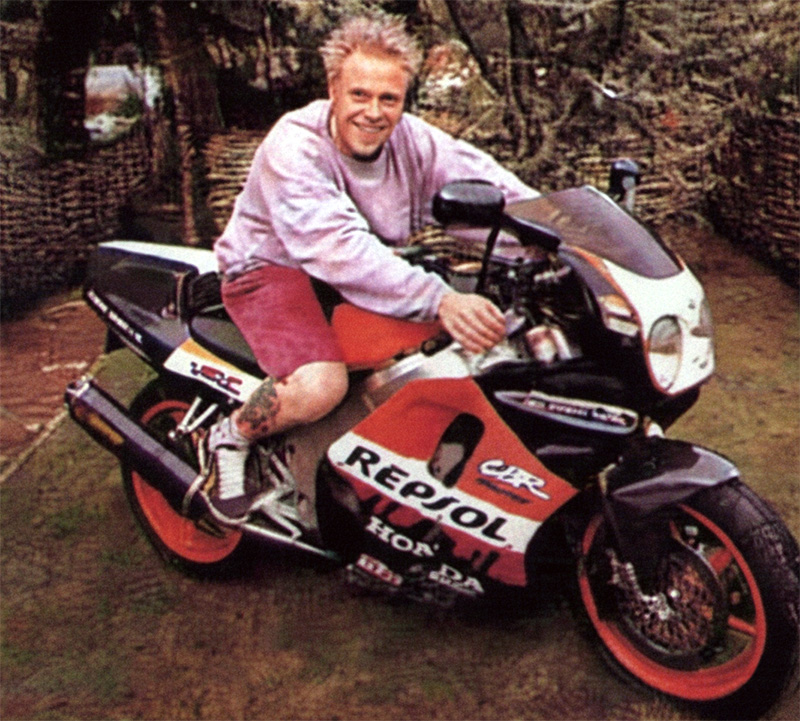
In addition to his usual ‘acid’, Liam unusually mixed the classic American melodic recitation of Gil Scott-Heron and his legendary ‘The Revolution Will Not Be Televised’ with a track by the breakbeat hardcore project Kaotic Chemistry called ‘Illegal Subs’, released in 1992. Just a couple of years later, Rob Playford of Kaotic Chemistry would become an icon of jungle music.
- Sample: bass
- Sample source: Gil Scott-Heron – The Revolution Will Not Be Televised [Pieces Of A Man, 1971]
- Sample: beat
- Sample source: Kaotic Chemistry – Illegal Subs [LSD EP, 1992]
- Original source: Prince And The New Power Generation – Ethereal Mix [Cream Remixes, 1991]
The track, like the entire album, turned out to be pretty cinematic, which prompted Liam to name it as if it was a ‘theme track’. Initially, one of the options for the album title was Music For The Joyriders, but Liam thought it sounded silly, yet it was this title that made its way into ‘Speedway’. In some promotional releases, as well as in licensing databases, the track is still referred to as Speedway (Theme From Joyriders).

Liam Howlett for NME (October 1994): “It was a friend who came up with the title in the end. I had something like ‘Music For The Cool Young Juvenile’ but that didn’t work. There were some pretty stupid titles around. We were going to call it ‘Music For Joy Riders’.”
It is worth remembering the real movie ‘Joyriders’, released in Ireland in 1988. Perhaps it was just a coincidence, and the title simply did not catch on, or perhaps the band found out about the film at the last minute and decided to avoid possible copyright claims, since ‘Theme From Joyriders’ would have looked like it was the main theme of this movie. In the end, the track was renamed to Theme From Fastlane, but the adventures of the title, already familiar to fans, did not end there.
‘Speedway’ in PRS catalogue
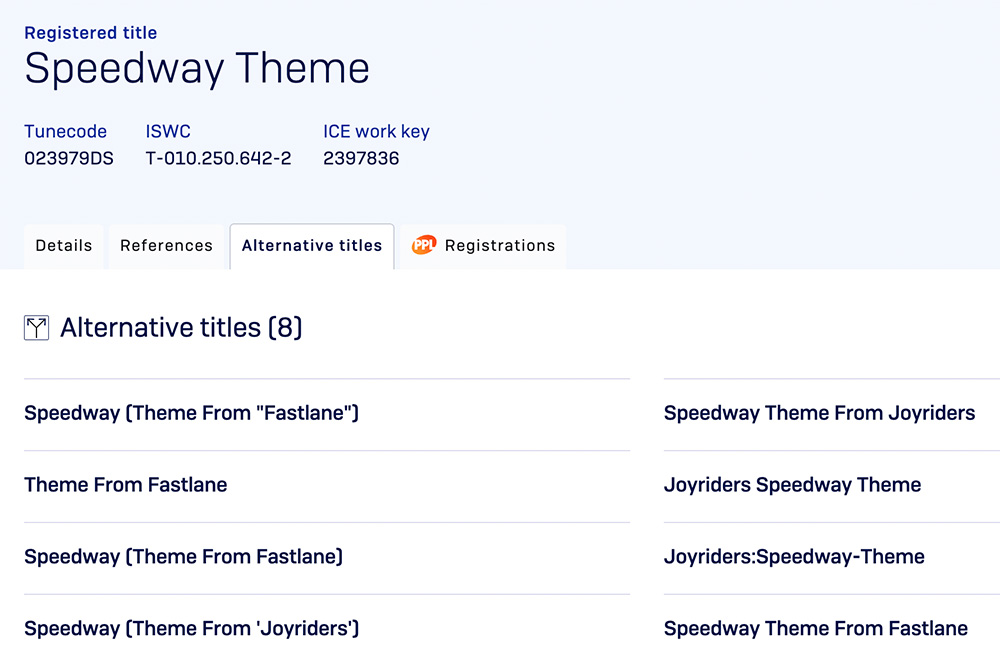
Neil Goodwin, director of the 1995 documentary ‘Life in the Fast Lane: The No M11 Story’, about protests against the construction of the British M11 motorway, repeatedly asked Liam Howlett for permission to use new music by The Prodigy as the soundtrack. Liam, in his usual manner, replied, “Let them build their damn motorway through my fucking garden — at least I’ll get to London faster!”. These words naturally offended the director, even leading to a sluggish war of words in the press. As a result, none of the new tracks made it onto the soundtrack, and it is unclear who borrowed the title ‘Fast Lane’ from whom — the film was released a year after the album, but it was prepared and filmed before its release.
‘Life in the Fast Lane: The No M11 Story’ documentary
Almost immediately after the album came out in 1994, ‘Speedway’ was added to the live setlist and performed in its original version for some time.
However, soon after Liam became fascinated with live jams (which we discussed in detail in our article ’94 Live Beats’), he made a live remix of ‘Speedway’ — and it is this remix that our team has recreated especially for this article!
Speaking of other versions of ‘Speedway’, we can also mention the official remix by Kris Needs, an artist, journalist, writer, and punk rock icon who witnessed the birth and heyday of the British punk scene in the 1970s. Needs’ work does not use many elements from the original, which, according to the man himself, was a conscious decision. We recently had the opportunity to chat with Kris himself, and he shared details and sources of inspiration.
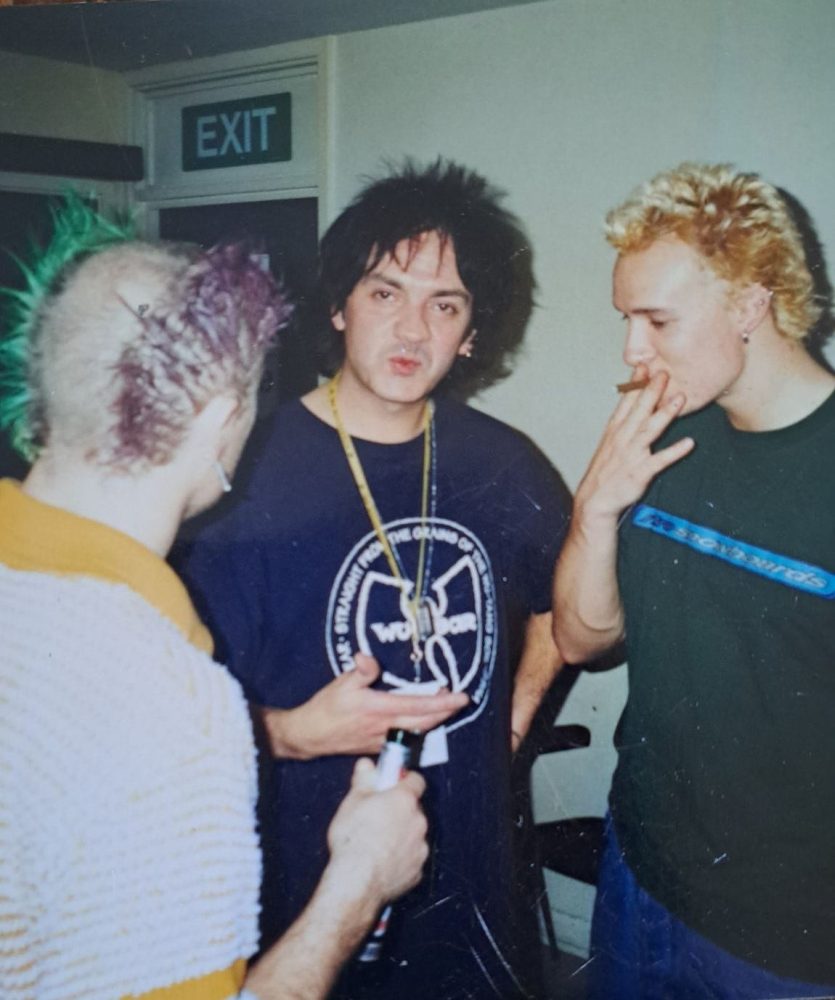
Kris Needs for All Souvenirs: “I’d been doing remixes since ’91 and think I was commissioned to rework ‘Speedway’ by Richard Russell at XL Recordings. It was probably in ’94. I have vague memories of doing it but can’t remember who with! I know I only worked with them once. The reason there’s not much original is I was very influenced by Weatherall, who sometimes used none of the original!”
The remix was first released the following year, in 1995, on two releases under two different titles. The first, Secret Knowledge Remix, in honour of Kris’ then-new band — it was released on 1 March on the American version of the single ‘Voodoo People’ from the Mute label (you can read about this release in our previous article). The second, Secret Knowledge Trouser Rouser, appeared on the sampler ‘XL-Recordings: The Fifth Chapter’. But what does this title mean?
Kris Needs for All Souvenirs: “There was a lot of toilet humour in certain electronic dance circles and I’d coined the phrase trance trousers in my Echoes column. You had to be there!”
There is also the extremely rare 12″ acetate vinyl ‘Speedway (Secret Knowledge Remix)’, which occasionally appears on eBay for exorbitant prices.
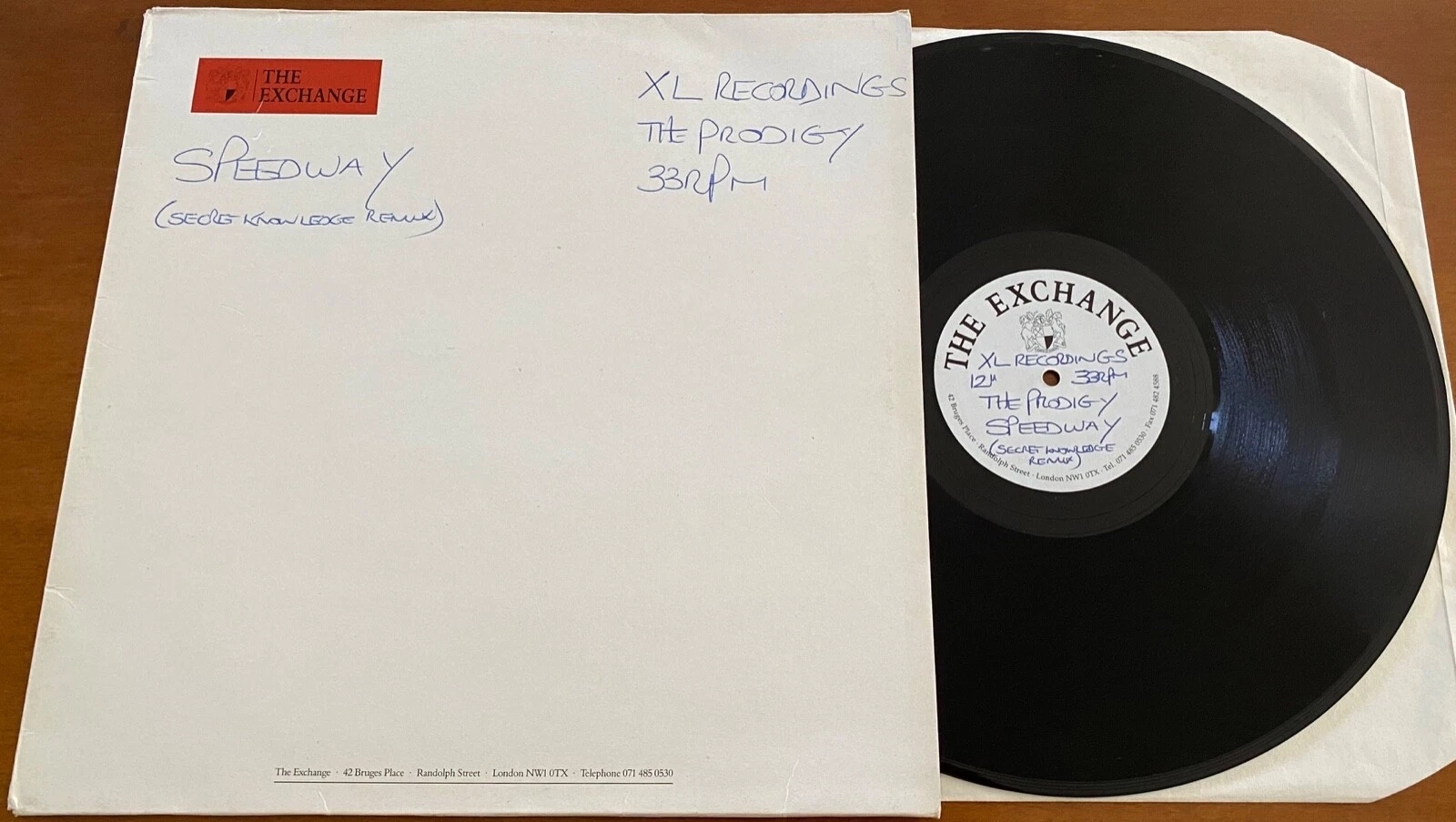
AMBIENT TRACK
Formally, according to the album tracklist, ‘The Heat (The Energy)’ follows ‘Speedway’, but in reality, the next track is a mysterious ambient track.
In early editions, it was added to ‘Speedway’ as a kind of ending. But as in the case of ‘Firedrill’ beats on the album ‘The Fat Of The Land’, which many still consider to be the ending of the track ‘Narayan’, things are not so simple here either. For example, on the 1994 CD release, ‘Speedway’ and the ambient track share one digital timeline. On the 1994 cassette release, this is even more obvious, as ‘Speedway’ and this ambient track simply end side A, and side B begins with ‘The Heat’. But on the vinyl release, ‘Speedway’ and ‘The Heat’ are on the same side, and here it may not seem so obvious. However, the first-press of the vinyl ‘Jilted Generation’ is a rare case where the official timings of all tracks are indicated on the labels, and here the timing of ‘Speedway’ is 8 min 56 sec, i.e. including this ambient ending.

However, on later digital reissues, this ambient track was moved to the intro of ‘The Heat (The Energy)’, while the old timings were retained on the vinyl reissue.
After many years of speculation and confusion, we were finally lucky enough to receive a brief comment from the author of the tracks himself. Liam confirmed that this is a separate untitled tune that he added specifically for those who listen to albums in their entirety without skipping tracks — a kind of hidden detail for attentive listeners. Despite numerous reissues of the album, this track has never been given a title.
Neil McLellan for All Souvenirs: “It was joined on the original LP from ‘Speedway’ into ‘The Heat’, but this has been lost in the digital copies, I think.”
The voice that whispers “Fly Away” has not yet been found, but almost all other samples have been identified in recent years. The musical basis is an excerpt from Vapour Space’s ‘Gravitational Arch Of 10’, as well as sounds from Roland JD-990 and E-mu Proteus/3 samplers.
- Sample: synth
- Sample source: Vapour Space – Gravitational Arch Of 10 [Gravitational Arch Of 10, 1993]
- Sample: fx
- Sample source: Roland JD-990 & SR-JV80-04 Vintage Synth – Patches – 246 Catch Me
- Sample: sitar
- Sample source: E-mu Proteus/3 – Patches – 117 AutomanEmpir
THE HEAT (THE ENERGY)
As for ‘The Heat (The Energy)’, the track was shaped under the heavy influence of early 90s techno and trance. The band already performed an early version live in ’93, well before the album was released.
In the early version, the introductory vocal samples from ‘Poltergeist 3’ were used without any processing, and the track’s arrangement was slightly different.
Our team has also recreated this version especially for this article!
By the time of release, the samples from the movie had, of course, been distorted — obviously to avoid copyright issues. But in addition to ‘Poltergeist’, the track also featured sample from the movie ‘Total Recall’ starring Arnold Schwarzenegger.
There is also a standalone follow-up to ‘The Heat’, released on 12 September 1994 on the ‘Voodoo People’ single under the title Goa (The Heat The Energy, Part 2). Inspired by the sound of the emerging ‘Goa Trance’ scene, it was born out of pure improvisation, as Howlett described in the Japanese booklet for ‘Selected Mixes For The Jilted Generation’.
Liam Howlett for the booklet: “This track is a hard, heavy, dirty acid track. This track was written when I was ‘jus’ jammin’ in my studio with Neil McLellan. We just set the tape rolling and the whole track was written live! It has a very hypnotic feel about it and becomes very intense towards the end”
Neil McLellan himself recalled this jam with excitement. In 2019, in honour of the 25th anniversary of Jilted Generation, Musictech magazine did a big interview with McLellan, where he shared a ton of studio insights — for example, that everything was written on tape without any automation. “We recorded to tape. Everything was recording and if you liked something that was good, you might sample it and put it in.” Neil said.
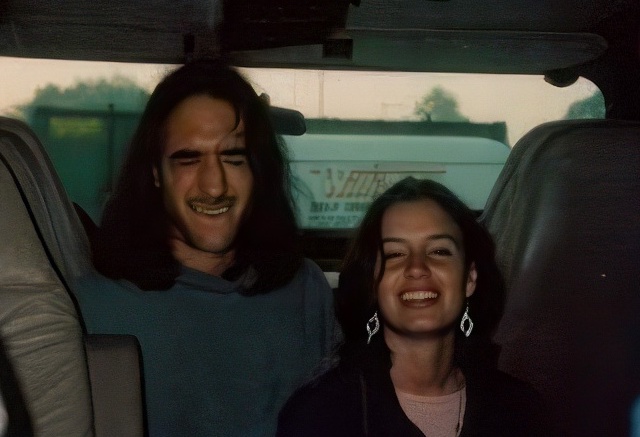
The only shot of Neil from the mid-90s that we could find. And yes, he used to have hair! 🙂
Musictech (July 2019): “Perhaps the most extreme manifestation of the analogue ethos is in Goa (The Heat The Energy, Part 2). The sound of the Roland TB-303 bassline has a distinctive tone as a result of an unusual production trick. Mclellan attached two Auratones to the underside of the soundboard of the grand piano in Strongroom, and close-mic’d the strings. The resultant acid bass is, in fact, entirely the pickup of those mics. This can be heard most prominently at the end of the track where you can hear the resonance of the strings as the noise floor rises. ‘It just did this thing that gave us huge body on a 303’ he says.”
It should be added that both parts of ‘The Heat’ are linked not only by a common base, but also by how they were used on stage during the same period. The original version of the track was created in late 1993 and was regularly performed at gigs even before the album was released. The track ‘Goa’ was recorded in early 1994, and for some time both tracks were played in the same live set, but in different parts of the show: ‘Goa’ opened the performances, while ‘The Heat’ was performed closer to the end.
In the next article, we’ll finally dive into the legendary track Poison — a single that turned 30 in 2025.
Headmasters: SIXSHOT, SPLIT
Additional thanks to: Kris Needs, Neil McLellan, Jo Jackson, Canyon Hill
Donate
- Tether (USDT)
Donate Tether(USDT) to this address

